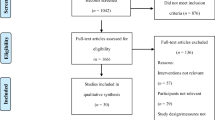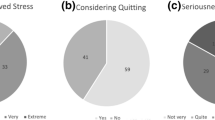Abstract
A study was recently commissioned by the South Australian Government to study the nature and sources of stress among correctional (prison) officers. The paper reports on the key variables found to have significant predictive effects on strain (a composite measure comprising psychological distress, physical ill-health symptoms, job dissatisfaction, and work-home conflict). These included demographic variables (length of service, finances), personal variables (negative affectivity), work environment variables (work role ambiguity, institutional relationship concerns, inmate concerns, worktime concerns, low autonomy, and low involvement), and emotional suppression. Recommendations were formulated including: the appointment of a full-time mental health counselor, organizational and individual strategies aimed to improve supervisor support and management training, greater participation in organizational decision making, and post-shift debriefing. It was also suggested that in selecting correctional officers those displaying high levels of negative affectivity should be screened out. Finally, it was recommended that intervention should target the most vulnerable individuals, including shiftworkers, officers who had been employed in the organization the longest, officers currently on stress leave and officers, who have previously been on stress leave and have returned to work. The paper reports on the organizational response to the recommendations and the implications of the study are discussed in the context of ongoing surveillance and evaluation of the impact of intervention strategies.
Similar content being viewed by others
References
Babbie, E. R. (1990).Survey research methods. California: Belmont, Wadsworth Publishing Co.
Baker, D. B. (1985). The study of stress at work.Annual Review of Public Health, 6, 367–381.
Dollard, M. F., Winefield, A. H., & McGuirk, T. E. (1992).Study into stress among correctional officers. Adelaide: Techsearch.
Dooley, D. (1990).Social research methods. Englewood Cliffs, NJ: Prentice-Hall.
Dunne, M. P., & Morrison, D. (1991). Health, stress and job satisfaction in prison officers.Journal of Occupational Health and Safety, 7, 49–58.
Goldberg, D. P. (1978).Manual of the General Health Questionnaire. Great Britain: Nfer-Nelson Publishing Company.
Greene, J. G. (1988). Stakeholder participation and utilization in program evaluation.Evaluation Review, 12, 91–116.
Ilgen, D. R. (1990). Health issues at work: Opportunities for industrial/organizational psychology.American Psychologist, 45, 273–283.
Inwald, R. E. (1982). Research problems in assessing stress factors in correctional institutions.International Journal of Offender Therapy and Comparative Criminology, 36, 250–254.
Keita, G. P., & Jones, J. M. (1990). Reducing adverse reaction to stress in the workplace: Psychology's expanding role.American Psychologist, 45, 1137–1141.
Long, N., Shouksmith, G., Voges, K., & Shannon, R. (1986). Stress in prison staff.Criminology, 24, 331–345.
Martin, J. G., & Westie, F. R. (1959). The tolerant personality.American Sociological Review.24, 251–258.
Moos, R. H. (1986).Work environment scale manual. Palo Alto, CA: Consulting Psychologists Press.
Offerman, L. R., & Gowing, M. K. (1990). Organizations of the future: Changes and challenges.American Psychologist, 45, 95–108.
Otto, R. (1985). Health damage through work stress: Is “stress management” the answer?New Doctor, 35, 13–15.
Rossi, P. H., & Freeman, H. E. (1989).Evaluation: A systematic approach. Newbury Park, CA: Sage.
Sauter, S. L., Murphy, L. R., & Hurrell, Jr., J. J. (1990). Prevention of work-related psychological disorders.American Psychologist, 45, 1146–1158.
Senese, J. D. (1991). Communications and inmate management: Interactions among jail employees.Journal of Criminal Justice, 19, 151–163.
Shauer, J. C. (1985). Role Stress Resulting from Role Conflict and Ambiguity Related to Organisational Change. UMI, Dissertation Information Service.
Spielberger, C. D., Gorsuch, R. L., Lushene, R., Vagg, P. R., and Jacobs, G. A. (1983).Manual for the State-Trait Anxiety Inventory. Palo Alto, CA: Consulting Psychologists Press.
Spillane, R. (1986). Overview of research developments in occupational stress. In M. G. Patrickson (Ed.),Readings in organizational behaviour. Adelaide, South Australia: Techsearch.
Terborg, J. R. (1988). The organization as a context for health promotion. In S. Spacapan & S. Oskamp (Eds.),The social psychology of health (pp. 129–174). Newbury Park, CA: Sage.
Voges, K. E., Long, N. R., Roach, M. S., & Shouksmith, G. A. (1982). The Perception of Stress by Prison Officers and Their Wives: An Occupational Study (Unpublished report).
Warr, P. B., Cook, J., & Wall, T. (1979). Scales for the measurement of work attitudes and psychological well-being.Journal of Occupational Psychology, 52, 129–148.
Webster, I. W., Porritt, D. W., & Brennan, P. J. (1983). Reported health, lifestyle and occupational stress in prison officers.Community Health Studies, 7, 266–277.
Author information
Authors and Affiliations
Rights and permissions
About this article
Cite this article
Dollard, M.F., Winefield, A.H. Organizational response to recommendations based on a study of stress among correctional officers. Int J Stress Manage 1, 81–101 (1994). https://doi.org/10.1007/BF01857284
Issue Date:
DOI: https://doi.org/10.1007/BF01857284




